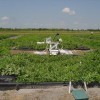Abstract
In Florida, watermelon is an important crop that accounts for a significant part of the state’s agricultural water use. Depending on the type of production system and climate, the water use of this crop can vary. In Florida, watermelon is predominantly grown on raised plastic-mulched beds. To develop improved water management and allocation plans, accurate water use estimates for watermelon are needed. Seepage irrigation under plastic mulch is a common production system used to produce watermelon in south and northeast Florida where the water table is shallow. Plastic mulch alters the rainfall entry and soil temperature of the raised beds and can significantly affect evapotranspiration. As there is no information on seepage-irrigated watermelon grown on plastic mulch for subtropical Florida, this 4-page fact sheet summarizes the results from a crop water use study for the seepage-irrigated watermelon in south Florida. Written by Sanjay Shukla and Niroj K. Shrestha, and published by the UF Department of Agricultural and Biological Engineering, August 2014.
References
Allen, R.G., Pereira, L.S., Raes, D., Smith, M., 1998. Crop evapotranspiration. Guidelines for computing crop water requirements. FAO Irrigation and Drainage paper 56. Rome, Italy. Food and Agriculture Organization of United Nations.
Jaber, F. H., S. Shukla, and S. Srivastava. 2006. Recharge, upflux, and water table response for shallow water conditions in southwest Florida. Hydrologic Process. 20(9): 1895-1907. https://doi.org/10.1002/hyp.5951
Shukla, S., Shrestha, N. K., Goswami, D. 2014. Evapotranspiration and crop coefficient for seepage-irrigated watermelon with plastic mulched in a sub-tropical Florida. Transaction of ASABE 57(4): 1-9. https://doi.org/10.1016/j.agwat.2013.09.019
Stanley, C. D. and Clark, G. A. 1991. Water table management using micro irrigation tubing. Soil Crop Science Society Florida Proceeding 50: 6-8.

